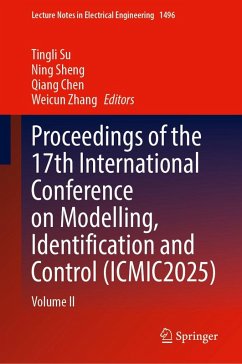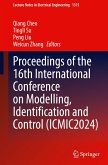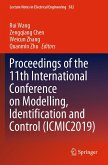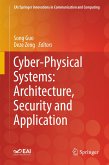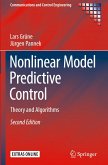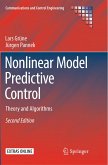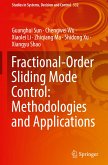Proceedings of the 17th International Conference on Modelling, Identification and Control (ICMIC2025)
Volume II
Herausgegeben:Su, Tingli; Sheng, Ning; Chen, Qiang; Zhang, Weicun
Proceedings of the 17th International Conference on Modelling, Identification and Control (ICMIC2025)
Volume II
Herausgegeben:Su, Tingli; Sheng, Ning; Chen, Qiang; Zhang, Weicun
- Gebundenes Buch
- Merkliste
- Auf die Merkliste
- Bewerten Bewerten
- Teilen
- Produkt teilen
- Produkterinnerung
- Produkterinnerung
This book includes original, peer-reviewed research papers from the 17th International Conference on Modelling, Identification and Control (ICMIC2025), held in Qingdao, Shandong, China on June 13-15, 2025. The topics covered include but are not limited to: System Identification, Linear/Nonlinear Control Systems, Data-driven Modelling and Control, Process Modelling and Process Control, Fault Diagnosis and Reliable Control, Intelligent Systems, and Machine Learning and Artificial Intelligence.
The papers showcased here share the latest findings on methodologies, algorithms and applications in…mehr
Andere Kunden interessierten sich auch für
![Proceedings of the 16th International Conference on Modelling, Identification and Control (ICMIC2024) Proceedings of the 16th International Conference on Modelling, Identification and Control (ICMIC2024)]() Proceedings of the 16th International Conference on Modelling, Identification and Control (ICMIC2024)213,99 €
Proceedings of the 16th International Conference on Modelling, Identification and Control (ICMIC2024)213,99 €![Proceedings of the 11th International Conference on Modelling, Identification and Control (Icmic2019) Proceedings of the 11th International Conference on Modelling, Identification and Control (Icmic2019)]() Proceedings of the 11th International Conference on Modelling, Identification and Control (Icmic2019)354,99 €
Proceedings of the 11th International Conference on Modelling, Identification and Control (Icmic2019)354,99 €![Proceedings of 2023 7th Chinese Conference on Swarm Intelligence and Cooperative Control Proceedings of 2023 7th Chinese Conference on Swarm Intelligence and Cooperative Control]() Proceedings of 2023 7th Chinese Conference on Swarm Intelligence and Cooperative Control229,99 €
Proceedings of 2023 7th Chinese Conference on Swarm Intelligence and Cooperative Control229,99 €![Cyber-Physical Systems: Architecture, Security and Application Cyber-Physical Systems: Architecture, Security and Application]() Cyber-Physical Systems: Architecture, Security and Application106,99 €
Cyber-Physical Systems: Architecture, Security and Application106,99 €![Nonlinear Model Predictive Control Nonlinear Model Predictive Control]() Lars GrüneNonlinear Model Predictive Control91,99 €
Lars GrüneNonlinear Model Predictive Control91,99 €![Nonlinear Model Predictive Control Nonlinear Model Predictive Control]() Lars GrüneNonlinear Model Predictive Control91,99 €
Lars GrüneNonlinear Model Predictive Control91,99 €![Fractional-Order Sliding Mode Control: Methodologies and Applications Fractional-Order Sliding Mode Control: Methodologies and Applications]() Guanghui SunFractional-Order Sliding Mode Control: Methodologies and Applications106,99 €
Guanghui SunFractional-Order Sliding Mode Control: Methodologies and Applications106,99 €-
-
-
This book includes original, peer-reviewed research papers from the 17th International Conference on Modelling, Identification and Control (ICMIC2025), held in Qingdao, Shandong, China on June 13-15, 2025. The topics covered include but are not limited to: System Identification, Linear/Nonlinear Control Systems, Data-driven Modelling and Control, Process Modelling and Process Control, Fault Diagnosis and Reliable Control, Intelligent Systems, and Machine Learning and Artificial Intelligence.
The papers showcased here share the latest findings on methodologies, algorithms and applications in modelling, identification, and control, integrated with Artificial Intelligence (AI), making the book an asset for researchers, engineers, and university students alike.
The papers showcased here share the latest findings on methodologies, algorithms and applications in modelling, identification, and control, integrated with Artificial Intelligence (AI), making the book an asset for researchers, engineers, and university students alike.
Produktdetails
- Produktdetails
- Lecture Notes in Electrical Engineering 1496
- Verlag: Springer, Berlin; Springer Nature Singapore; Springer
- Artikelnr. des Verlages: 89580583
- Seitenzahl: 532
- Erscheinungstermin: 14. Januar 2026
- Englisch
- Abmessung: 235mm x 155mm
- ISBN-13: 9789819533152
- ISBN-10: 9819533155
- Artikelnr.: 75379769
- Herstellerkennzeichnung
- Springer-Verlag GmbH
- Tiergartenstr. 17
- 69121 Heidelberg
- ProductSafety@springernature.com
- Lecture Notes in Electrical Engineering 1496
- Verlag: Springer, Berlin; Springer Nature Singapore; Springer
- Artikelnr. des Verlages: 89580583
- Seitenzahl: 532
- Erscheinungstermin: 14. Januar 2026
- Englisch
- Abmessung: 235mm x 155mm
- ISBN-13: 9789819533152
- ISBN-10: 9819533155
- Artikelnr.: 75379769
- Herstellerkennzeichnung
- Springer-Verlag GmbH
- Tiergartenstr. 17
- 69121 Heidelberg
- ProductSafety@springernature.com
Tingli Su received her B.E. degree in Mechatronic Engineering and the Ph.D. degree in Control Science and Engineering from Beijing Institute of Technology. During 2009 and 2012, she has been a visiting student in University of Bristol with her work on Networked Control Systems. She is now an associate professor in Beijing Technology and Business University. Her research interests lie in the multi-sensor fusion, data analytics, and series-data based state estimation. She has published over 20 journal papers as the first author or corresponding author, holds 2 authorized invention patents, and has contributed to 3 academic monographs. Ning Sheng obtained her Ph.D. in Control Science and Engineering from Northeastern University. Currently, she is an associate professor and the vice dean of the School of Automation and Electronic Engineering at Qingdao University of Science and Technology. Her research interests lie in intelligent control of nonlinear systems, fault-tolerant control, and fault diagnosis, etc. She has published over 30 journal papers as the first or corresponding author and holds 5 authorized invention patents. Qiang Chen (Member, IEEE) received the B.S. degree in measurement and control technology and instrumentation from Hebei Agricultural University, Baoding, China, in 2006, and the Ph.D. degree in control science and engineering from Beijing Institute of Technology, Beijing, China, in 2012. Since 2012, he has been with the College of Information Engineering, Zhejiang University of Technology, Hangzhou, China, where he is currently a Professor. He has published over 100 peer-reviewed papers in journals and conference proceedings, and has been authorized more than 60 invention patents, 13 of which were transferred. His research interests include adaptive control and iterative learning control with application to motion control systems. Weicun Zhang is an associate professor of the School of Automation and Electrical Engineering, University of Science and Technology Beijing. He earned his Ph. D degree from Tsinghua University in the field of control theory. His research interest includes: self-tuning adaptive control, multiple model adaptive control/estimation of both linear and nonlinear systems. As representative research work, he established a Virtual Equivalent System (VES) theory for unified analysis of adaptive control systems, which is independent of specific control strategy and parameter estimation algorithm. Recently, he published a paper on the Riemann Hypothesis.
Chapter 1: Sample
Based Confidence Polytope for Linear Regression Model with Endogenous Regressors Guaranteed Probabilistic Lower Bounds.
Chapter 2: Stability Analysis and Control Design for 2
D Switched Affine Systems.
Chapter 3: Targeted Detection of Unsafe Behavior of Factory Personnel Based on YOLOv5.
Chapter 4: Analysis for Continuation Degree of Steelmaking
Continuous Casting Process.
Chapter 5: Nonlinear Dynamics Adjustment in Robotic Trajectory Control with Accelerated Convergence.
Chapter 6: Soft Sensor Modeling Based on Dual
Stream Multi
scale GRU with Feature Fusion Mechanism.
Chapter 7: Adaptive Finite Time Control of Rotary Inverted Pendulum Based on Neural Networks.
Chapter 8: Sliding Mode Control of T
S Fuzzy Switched Systems with Multi
node Stochastic Communication Protocol.
Chapter 9: Sliding Mode Control of Uncertain Switched Systems with Stochastic Communication Protocols.
Chapter10: Advanced Marching Cubes Algorithm for Efficient 3D Reconstruction and Visualization of Tumor Target Areas.
Based Confidence Polytope for Linear Regression Model with Endogenous Regressors Guaranteed Probabilistic Lower Bounds.
Chapter 2: Stability Analysis and Control Design for 2
D Switched Affine Systems.
Chapter 3: Targeted Detection of Unsafe Behavior of Factory Personnel Based on YOLOv5.
Chapter 4: Analysis for Continuation Degree of Steelmaking
Continuous Casting Process.
Chapter 5: Nonlinear Dynamics Adjustment in Robotic Trajectory Control with Accelerated Convergence.
Chapter 6: Soft Sensor Modeling Based on Dual
Stream Multi
scale GRU with Feature Fusion Mechanism.
Chapter 7: Adaptive Finite Time Control of Rotary Inverted Pendulum Based on Neural Networks.
Chapter 8: Sliding Mode Control of T
S Fuzzy Switched Systems with Multi
node Stochastic Communication Protocol.
Chapter 9: Sliding Mode Control of Uncertain Switched Systems with Stochastic Communication Protocols.
Chapter10: Advanced Marching Cubes Algorithm for Efficient 3D Reconstruction and Visualization of Tumor Target Areas.
Chapter 1: Sample
Based Confidence Polytope for Linear Regression Model with Endogenous Regressors Guaranteed Probabilistic Lower Bounds.
Chapter 2: Stability Analysis and Control Design for 2
D Switched Affine Systems.
Chapter 3: Targeted Detection of Unsafe Behavior of Factory Personnel Based on YOLOv5.
Chapter 4: Analysis for Continuation Degree of Steelmaking
Continuous Casting Process.
Chapter 5: Nonlinear Dynamics Adjustment in Robotic Trajectory Control with Accelerated Convergence.
Chapter 6: Soft Sensor Modeling Based on Dual
Stream Multi
scale GRU with Feature Fusion Mechanism.
Chapter 7: Adaptive Finite Time Control of Rotary Inverted Pendulum Based on Neural Networks.
Chapter 8: Sliding Mode Control of T
S Fuzzy Switched Systems with Multi
node Stochastic Communication Protocol.
Chapter 9: Sliding Mode Control of Uncertain Switched Systems with Stochastic Communication Protocols.
Chapter10: Advanced Marching Cubes Algorithm for Efficient 3D Reconstruction and Visualization of Tumor Target Areas.
Based Confidence Polytope for Linear Regression Model with Endogenous Regressors Guaranteed Probabilistic Lower Bounds.
Chapter 2: Stability Analysis and Control Design for 2
D Switched Affine Systems.
Chapter 3: Targeted Detection of Unsafe Behavior of Factory Personnel Based on YOLOv5.
Chapter 4: Analysis for Continuation Degree of Steelmaking
Continuous Casting Process.
Chapter 5: Nonlinear Dynamics Adjustment in Robotic Trajectory Control with Accelerated Convergence.
Chapter 6: Soft Sensor Modeling Based on Dual
Stream Multi
scale GRU with Feature Fusion Mechanism.
Chapter 7: Adaptive Finite Time Control of Rotary Inverted Pendulum Based on Neural Networks.
Chapter 8: Sliding Mode Control of T
S Fuzzy Switched Systems with Multi
node Stochastic Communication Protocol.
Chapter 9: Sliding Mode Control of Uncertain Switched Systems with Stochastic Communication Protocols.
Chapter10: Advanced Marching Cubes Algorithm for Efficient 3D Reconstruction and Visualization of Tumor Target Areas.

